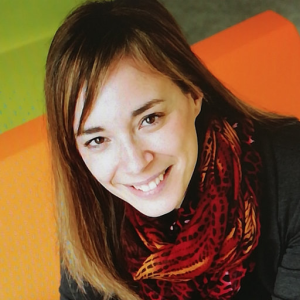
Cristina González Fernández
| AREA | RESEARCH GROUP | INSTITUTE |
|---|---|---|
| Chemical Engineering | Environmental Technology | Institute for Sustainable Processes |
I have a degree in Chemical Sciences from the University of Valladolid (2002, Spain), a Master's degree in Environmental Sciences from the University of Cincinnati (2005, USA) and a PhD in Process and Systems Engineering from the University of Valladolid (2008). In 2008, I joined the Instituto Tecnológico de Agricultura de Castilla-León, where I continued working in laboratory and full-scale plants that treat livestock effluents and also perform consultancy for companies. In 2010, I was a postdoctoral researcher at the French National Agricultural Research Institute (LBE-INRA, France) where I worked on the optimisation of anaerobic processes using microalgae as substrate. Since 2011, I developed my career at IMDEA Energía (Spain) as Head of the Biotechnology Unit.
I obtained a Ramón y Cajal contract (2015), i3 certificate (2019) and I am "guarantor" of the María de Maeztu Unit of Excellence (2020) recently awarded to IMDEA Energía. I am co-author of 100 scientific publications (87% Q1), 7 international book chapters, editor of 2 books (Elsevier), guest editor of 4 special issues of international journals and reviewer of multiple international journals. I have supervised 5 Doctoral Theses (+4 in progress) and 20 Bachelor and Master Theses.
I am responsible for the coordination of several European and Spanish funded research projects, as well as projects with private companies. My scientific career has been completed with teaching tasks. Therefore, in February 2022, I joined the University of Valladolid as a distinguished researcher in order to combine teaching and research tasks.
Study fermentation processes that allow carbon to be recovered from waste in order to convert it into other bioproducts. These bioprocesses are carried out using different aerobic and anaerobic microorganisms. These microorganisms allow us to obtain bioproducts and biofuels that can often replace petroleum derivatives and therefore contribute to the development of a circular economy. In particular, the last few years have been dedicated to producing microbial oils that allow us to broaden the sources of oils to reduce the consumption/use of fossil fuels and the production of carboxylates that are platform molecules for the production of other industrial compounds.
My vision is focused on the development of energy-saving and environmentally friendly processes. In this sense, I always keep in mind the subsequent scale-up of the processes developed at laboratory level and I always work with the most realistic conditions and real waste.

